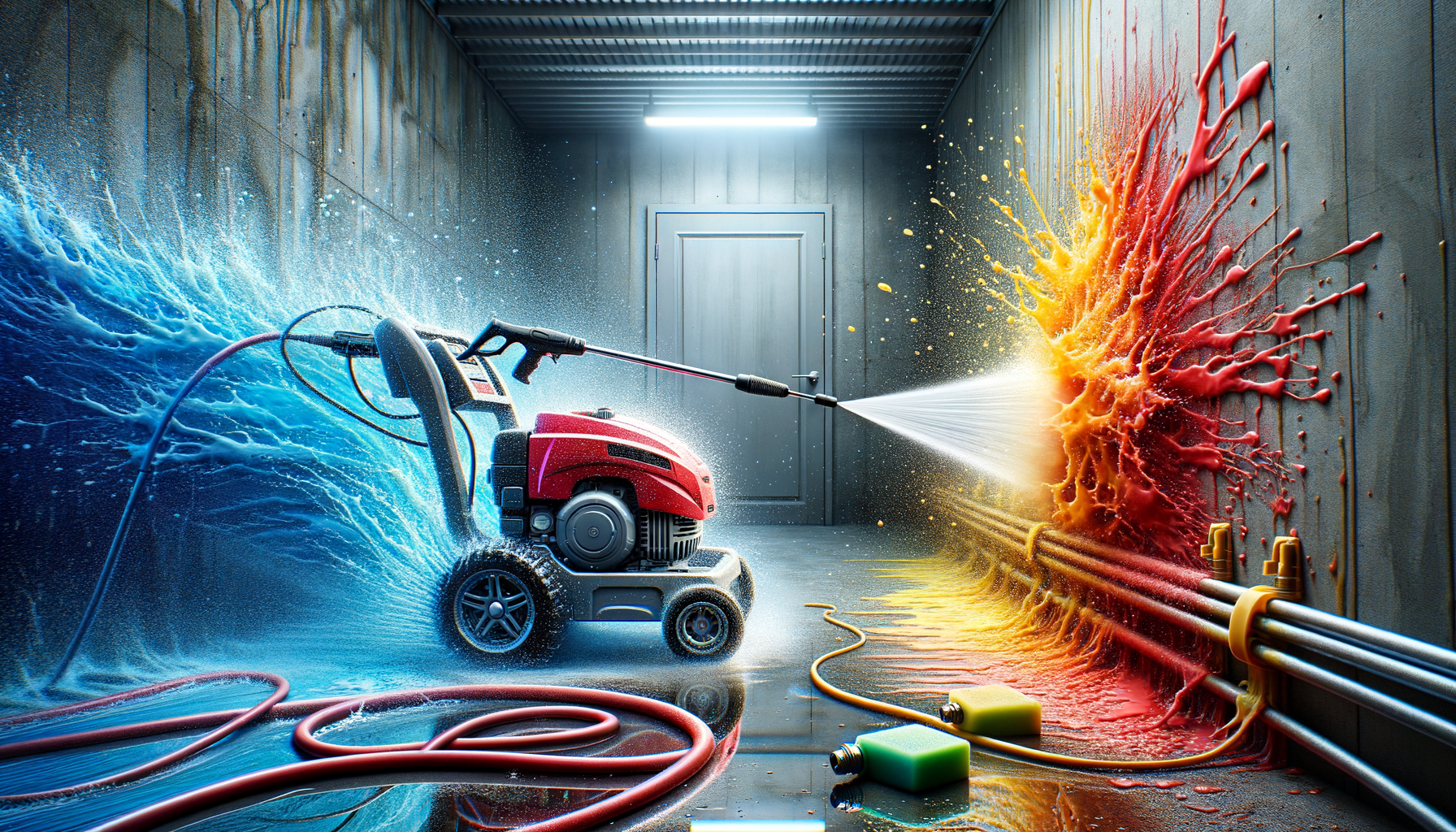Understanding Pressure Washers: The Basics
Pressure washers are powerful cleaning tools that utilize high-pressure water jets to remove dirt, grime, mold, and stains from various surfaces. They are often employed to clean outdoor areas like driveways, patios, decks, and siding. The core of a pressure washer is its motor, which powers a pump that pressurizes water from a standard hose connection. This pressurized water is then expelled through a nozzle, creating a forceful stream capable of deep cleaning.
There are two main types of pressure washers: electric and gas-powered. Electric models are generally lighter and quieter, making them suitable for residential use. They are ideal for lighter cleaning tasks such as washing cars, outdoor furniture, and small decks. Gas-powered pressure washers, on the other hand, are more powerful and better suited for heavy-duty cleaning tasks like stripping paint or cleaning large areas quickly. These machines are often used in commercial settings but can also be beneficial for homeowners with extensive cleaning needs.
Pressure washers come with various nozzles that alter the spray pattern and intensity. Common nozzle types include:
- 0-degree (red): Delivers a pinpoint stream for tough stains.
- 15-degree (yellow): Provides a narrow spray for heavy-duty cleaning.
- 25-degree (green): Offers a versatile spray for general cleaning.
- 40-degree (white): Suitable for light cleaning and rinsing.
- Soap nozzle (black): Used for applying detergent.
Understanding the basics of pressure washers helps in selecting the right model and accessories to achieve optimal cleaning results.
The Advantages of Using Pressure Washers
Pressure washers offer a range of advantages that make them a valuable tool for homeowners and professionals alike. One of the primary benefits is their ability to save time and effort compared to traditional cleaning methods. The high-pressure water stream can quickly remove dirt and grime, reducing the need for scrubbing and manual labor.
Another advantage is the versatility of pressure washers. They can be used on a variety of surfaces, including concrete, wood, metal, and plastic, without causing damage when used correctly. This versatility makes them suitable for cleaning everything from vehicles and boats to fences and outdoor furniture.
Pressure washers are also environmentally friendly, as they use less water than a standard garden hose while delivering more cleaning power. This efficiency not only conserves water but also reduces the amount of detergent needed for effective cleaning. Many pressure washers are designed to work with biodegradable detergents, further minimizing their environmental impact.
Moreover, pressure washers can enhance the curb appeal of a property by removing unsightly stains and buildup that detract from the overall appearance. Regular cleaning with a pressure washer can extend the life of surfaces by preventing the growth of mold and mildew, which can cause long-term damage.
In summary, the advantages of pressure washers include time and effort savings, versatility, environmental benefits, and improved property aesthetics. These benefits make them an excellent investment for maintaining a clean and attractive environment.
Choosing the Right Pressure Washer for Your Needs
Selecting the appropriate pressure washer involves considering several factors to ensure it meets your specific cleaning requirements. The first consideration is the power source: electric or gas. Electric pressure washers are ideal for small to medium tasks around the home, while gas-powered models are better suited for larger, more demanding jobs.
Another important factor is the pressure washer’s PSI (pounds per square inch) and GPM (gallons per minute) ratings. PSI measures the force of the water, while GPM indicates the water flow rate. A higher PSI and GPM result in more powerful cleaning capabilities. For light cleaning tasks, a PSI of 1300-2000 and GPM of 1.5-2.0 is usually sufficient. For heavy-duty cleaning, look for models with a PSI of 2800-4000 and GPM of 2.5-4.0.
Consider the features and accessories that come with the pressure washer. Some models offer adjustable pressure settings, interchangeable nozzles, and onboard detergent tanks, which enhance their usability and convenience. Additionally, check for safety features such as automatic shut-off and thermal relief to prevent overheating.
Portability and storage are also important considerations. Lightweight models with wheels and compact designs are easier to maneuver and store. For those with limited storage space, a foldable handle or wall-mounting option can be beneficial.
Ultimately, the right pressure washer should align with your cleaning needs, budget, and storage capabilities. By carefully evaluating these factors, you can make an informed decision and enjoy the benefits of efficient and effective cleaning.
Safety Tips for Using Pressure Washers
While pressure washers are powerful cleaning tools, they require careful handling to ensure safety. The high-pressure water stream can cause injuries if not used properly, making it essential to follow safety guidelines.
Before using a pressure washer, read the manufacturer’s instructions and familiarize yourself with the machine’s controls and features. Wear appropriate protective gear, including safety goggles, gloves, and non-slip shoes, to protect yourself from flying debris and accidental slips.
When operating a pressure washer, always maintain a firm grip on the spray gun and stand on a stable surface. Avoid pointing the nozzle at yourself, others, or pets, as the high-pressure water can cause serious injuries. Keep a safe distance from the surface being cleaned to prevent damage and ensure effective cleaning.
Be cautious when using detergents, as some can be harmful to plants and animals. Use only recommended cleaning solutions and follow the instructions for dilution and application. After cleaning, rinse the area thoroughly to remove any detergent residue.
Regular maintenance of your pressure washer is crucial for safe operation. Check hoses, nozzles, and connections for signs of wear or damage, and replace any faulty parts. Store the pressure washer in a dry, secure location to prevent rust and corrosion.
By adhering to these safety tips, you can enjoy the benefits of pressure washing while minimizing the risk of accidents and injuries.
Creative Uses for Pressure Washers
Beyond the typical cleaning tasks, pressure washers can be employed in a variety of creative ways to tackle unconventional projects. One such use is cleaning outdoor recreational equipment, such as bicycles, skateboards, and sports gear. The pressure washer’s powerful stream can effectively remove dirt and grime, extending the life of these items.
Pressure washers can also be used to clean garden tools and equipment. Over time, tools can accumulate soil and debris, which can affect their performance. A quick rinse with a pressure washer can restore their functionality and appearance.
Another innovative use is cleaning outdoor play structures and toys. Children’s playsets, slides, and plastic toys can harbor dirt and bacteria, making them less appealing and potentially unsafe. A pressure washer can sanitize these items quickly, ensuring a clean and safe play environment.
For those with artistic flair, pressure washers can be used to create unique outdoor art. By using stencils on surfaces like sidewalks or walls, you can blast away dirt to reveal clean patterns and designs, transforming mundane areas into creative displays.
Lastly, pressure washers can aid in preparing surfaces for painting or staining. By removing old paint, dirt, and mildew, these machines provide a clean, smooth surface that ensures better adhesion and a longer-lasting finish.
These creative uses highlight the versatility of pressure washers, proving that they are not just for cleaning but also for enhancing and maintaining various aspects of your home and outdoor environment.




Leave a Reply